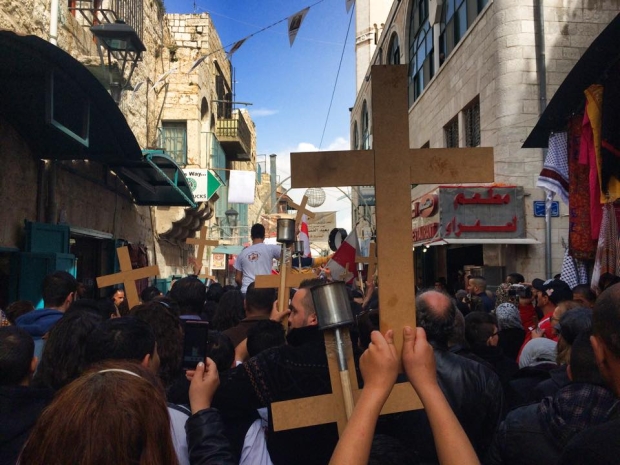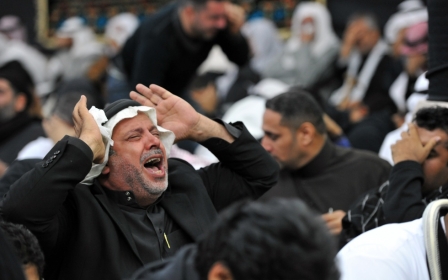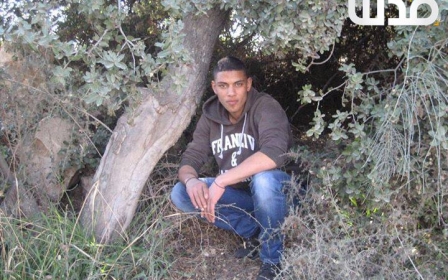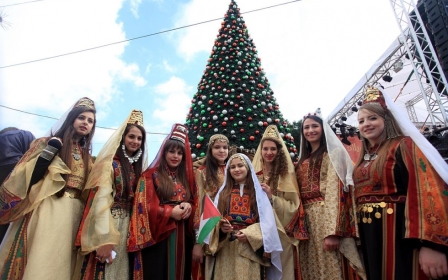Palestinian Christians celebrate identity in Easter rituals
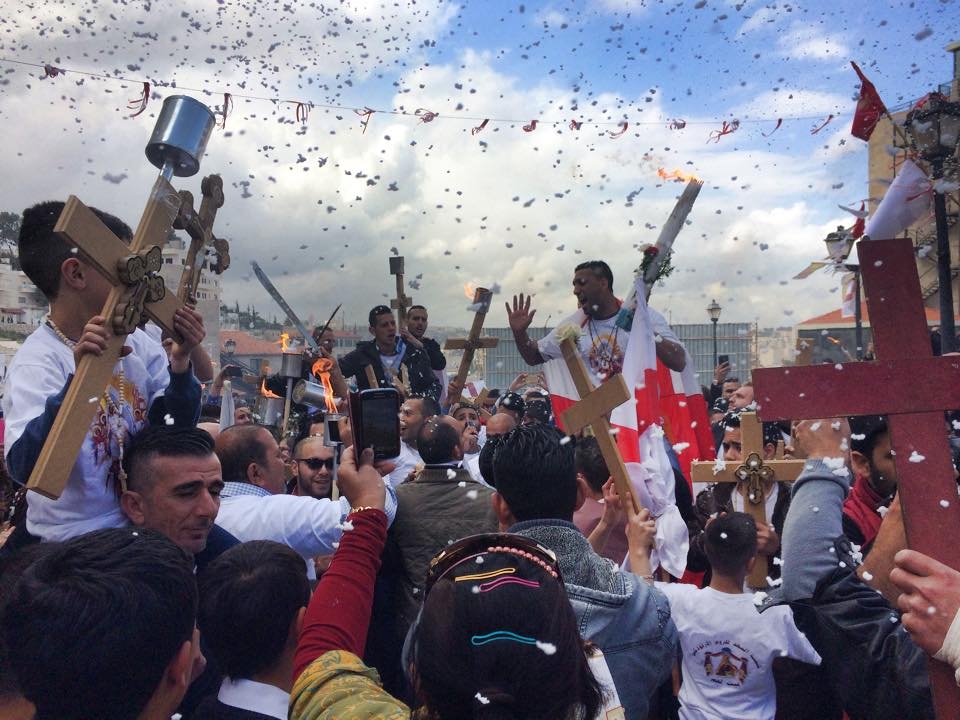
BETHLEHEM, West Bank - Once a year, as happened on Saturday, the streets of dozens of Palestinian cities and villages across the West Bank and inside Israel resound with Arabic chants proclaiming the glory of Christ and peace upon the Virgin Mary.
Large crowds gather holding aloft crucifixes adorned with Orthodox icons, while young men wave swords and olive wood crosses covered in flowers in the air.
Surprisingly perhaps, the biggest Christian festivity in the Holy Land is neither Christmas nor Easter. Instead, it is a holiday little talked about outside of the Orthodox world known as “Holy Saturday” or more commonly in Arabic, “Saturday of the Fire”.
The holiday marks what believers say is a yearly miracle that takes place the day before Easter, when a holy fire emanates from the tomb of Jesus Christ at the Church of the Holy Sepulchre in East Jerusalem.
Orthodox priests emerge from an antechamber with a lit holy fire every year at the same time on the same day. From there the fire is spread to every town across Palestine with a Christian community, and eventually to Greece, Russia, and other Orthodox-majority countries where the holiday is observed.
But this day has come to have more than just religious significance and in the eyes of the faithful.
Confronted by the Israeli occupation locally and an increasingly sectarian climate across the region, for the 200,000 Palestinian Christians - including about 50,000 in the West Bank - one of the most important parts of Holy Saturday is the large marches that greet the holy fire as it arrives in every town. These marches are a visible assertion of community pride and contribute to the strengthening of local identity throughout Christian Palestine.
‘Fear has overtaken everybody’
Amid widespread Israeli restrictions on Palestinians’ movement and access into Jerusalem, where the majority of Christian holy sites are located, Holy Saturday marches offer an alternative for those denied entry by Israeli authorities.
In a 2012 report, the US State Department noted how these restrictions “negatively affected” the freedom of worship of both Christian and Muslim Palestinians, pointing out in the Christian case that “the separation barrier significantly impeded Bethlehem-area Christians from reaching the Church of the Holy Sepulchre in Jerusalem and made visits to Christian sites in Bethany and Bethlehem difficult for Palestinian Christians who live on the Jerusalem side of the barrier.”
But even those who do manage to secure permits to enter Jerusalem are often dissuaded by the militarised Israeli security present in the occupied city.
Elias Deis, a native of the Bethlehem-area town of Beit Sahour and activist in the local Greek Orthodox church, told Middle East Eye in an interview that even when he and his family are technically able to attend Easter ceremonies in Jerusalem, they rarely do so anymore.
“In general, fear has overtaken everybody,” he told MEE. “A lot of people love to celebrate Holy Saturday in Jerusalem, but they don’t go because they know that in the Old City there are Israeli checkpoints and soldiers everywhere.”
“You don’t feel security or freedom of worship when you’re there, nor do you feel like you’re in a holy place. I was in the Church of the Holy Sepulchre recently and all of my focus was on the soldiers and police everywhere. All I could see was the occupation around me.”
Palestinian Christians as well as foreign pilgrims are subjected to numerous security procedures in the alleyways of Jerusalem’s Old City. During evening services on Good Friday, there were dozens of soldiers staffing barricades both inside and around the Holy Sepulchre preventing worshipers from entering despite a lack of visible crowding. Barking orders in Hebrew at masses of primarily Palestinian, Egyptian and Russian pilgrims with no knowledge of the language, the situation escalated numerous times into arguments and physical confrontations.
A celebration of community pride
As a result of this combination of restrictions and fear, local celebrations and ceremonies have increasingly taken centre stage in the religious life of many Palestinian Christians.
Nowhere is Holy Saturday more important than in Bethlehem, where the largest concentration of Christians in the West Bank wrestles with the issues facing a relatively well-educated and successful community under Israeli occupation.
Once known fondly as Jerusalem’s “twin”, the hilltop town is today a shadow of its former self as a result of decades of military rule and restrictions on movement that have left many of its sons and daughters in prison and pushed many more into exile. The Israeli siege of the Church of the Nativity in 2002 put the pressure facing the town and its residents into stark relief, and, even more than a decade later, homes, cafes, and public squares are adorned with photographs of the fallen.
Today, the problems confronting Bethlehem are more structural. The construction of the Israeli separation wall through the town and the virtual annexation of large swathes of agricultural land all around it has crippled the once-profitable tourism industry. The United Nations has estimated that more than 85 percent of land in the Bethlehem region is under full Israeli military control, the vast majority of which is completely off-limits to any Palestinian development.
As a result, the 200,000 residents of the region, including the approximately 30,000 in the town itself, find themselves stuck in an island of limited Palestinian sovereignty with few options.
Christians make up less than half of the population of the region around Bethlehem mostly spread between the town of Jesus’ birth and nearby towns of Beit Sahour and Beit Jala. Because of their historically urban status and extensive access to education through programmes funded by foreign churches, Christians today tend to be on average better off than other Palestinians.
This very success, however, has not been sufficient to protect the community’s future, as tens of thousands have emigrated in search of better opportunities abroad.
This flight has been reinforced by visa procedures that advantage local Christians, both formally and informally. One local restaurant owner told MEE of his shock at arriving at an interview at the US consulate only to be asked a few questions on Biblical stories, primarily those where the Muslim and Christian narratives diverge, and then being summarily granted the visa when he correctly gave the Christian version.
In survey after survey, Palestinian Christians have stressed that the primary reasons for emigration are the lack of economic opportunities as well as the political situation, both of which are directly tied to the Israeli occupation. In every survey conducted, fewer than 10 percent, and often much lower, cited “religious fanaticism” or “Islamic movements” among the causes.
The conflicts in Iraq and Syria, and the increasing politicisation of sectarian difference they have led to, however, have created a growing sense of existential threat in Christian communities across the region.
Even in Palestine, where groups such as the Islamic State (IS) have no presence to speak of and are widely detested by Christians and Muslims alike, there is a palpable sense that something is changing. Emigration in search of better opportunities abroad compounds this fear, as the community decreases in relative size and thus the sense of being in peril increases.
In these circumstances, Holy Saturday is an increasingly important display of pride and belonging for local Christians.
“There is a lot of enthusiasm among Christians to show that we as Christians are here and we are not afraid of anything, to validate and prove our existence here,” Deis told MEE. He said the marches were also in some way a message to groups like IS, who see Christians as inherently foreign to the region.
The slogans at the marches reflect these sentiments, with general spiritual chants mixed in between those calling upon local saints and others proclaiming community pride on the Saturday of Fire.
New MEE newsletter: Jerusalem Dispatch
Sign up to get the latest insights and analysis on Israel-Palestine, alongside Turkey Unpacked and other MEE newsletters
Middle East Eye delivers independent and unrivalled coverage and analysis of the Middle East, North Africa and beyond. To learn more about republishing this content and the associated fees, please fill out this form. More about MEE can be found here.


